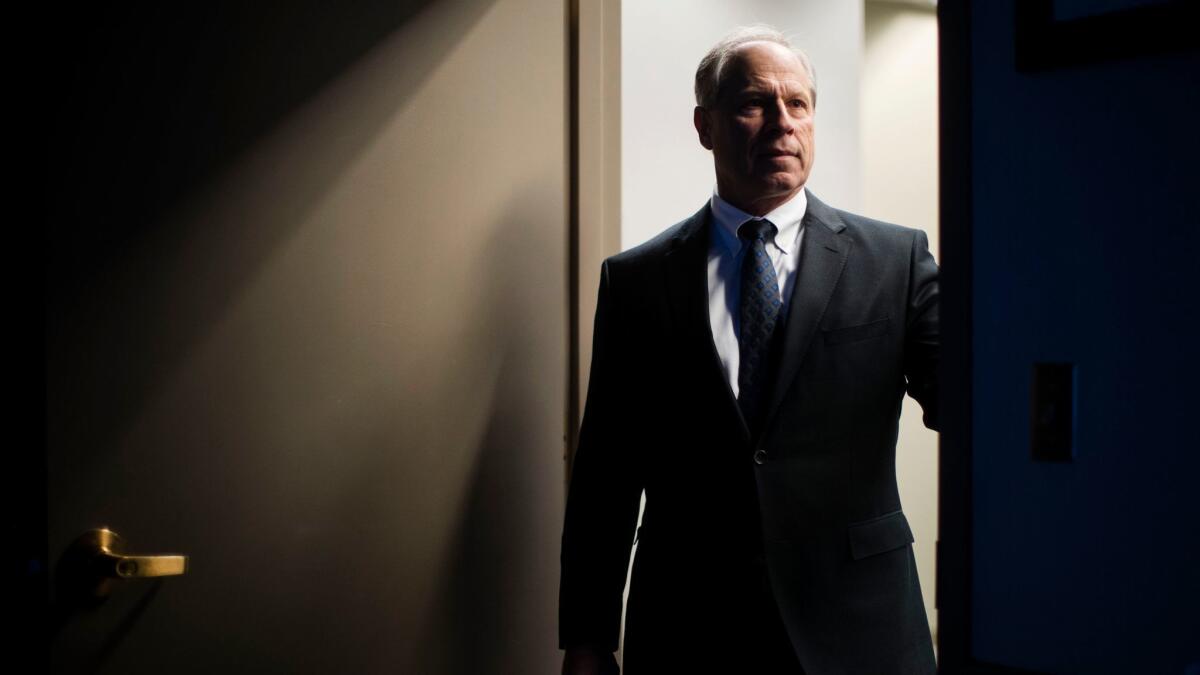A federal prosecutor takes on the heroin scourge that claimed his son

- Share via
Reporting from HARRISBURG, Pa. — The phone at Bruce Brandler’s home rang at 3:37 a.m. It was the local hospital. His 16-year-old son was there, and he was in really bad shape.
A suspected heroin overdose, the nurse said.
Brandler didn’t believe it. Erik had his problems, but heroin? It seemed impossible.
Nearly 10 years later, the nation is gripped by a spiraling crisis of opioid and heroin abuse — and Brandler, a veteran federal prosecutor recently promoted to interim U.S. attorney, suddenly finds himself in a position to do something about the scourge that claimed his youngest son’s life.
Until now, he had never publicly discussed Erik’s overdose death. It was private and just too painful. But Brandler, now the chief federal law enforcement officer for a sprawling judicial district that covers half of Pennsylvania, said he felt a responsibility with his new, higher-profile job.
“It’s easier to cope with the passage of time, but it never goes away,” Brandler told the Associated Press in an interview. “And, frankly, this whole heroin epidemic has brought it to the forefront.”
Fatal heroin overdoses have more than quintupled in the years since Brandler lost his son. The illicit drug, along with highly addictive prescription pain relievers like oxycodone and fentanyl — a substance more powerful than heroin — now rival car crashes as the leading cause of accidental death in the U.S.
Erik’s death proved that heroin doesn’t discriminate, Brandler said. He urged parents to “open their eyes” to the threat and talk to their kids.
“I want to evaporate the myth that heroin addicts are just homeless derelicts,” said Brandler, who, before his son’s overdose, held that impression himself. “This epidemic hits everybody, and I think my situation exemplifies that.”
The opioid crisis was already taking root when Brandler began having problems with Erik, the youngest of his three children. The teenager’s grades dropped, his friends changed and he began keeping irregular hours. Brandler found marijuana in his room and talked to him about it, figuring that was the extent of his drug use.
Then, in spring 2007, Erik overdosed on Ecstasy and had to be treated at a hospital.
“That elevated it to a different level as far as I was concerned — a much more serious level — and I took what I thought were appropriate steps,” Brandler said.
He called the police on his son’s dealer, who was prosecuted. That summer, Erik completed an intensive treatment program that included frequent drug testing. Brandler thought his son had turned a corner.
He was mistaken.
On the night of Aug. 18, 2007, Erik and an older friend paid $60 for three bags of heroin. After shooting up, Erik passed out. His breathing became labored, his lips pale. But his companions didn’t seek medical treatment, not then and not for hours. Finally, around 3 a.m., they dropped him off at the hospital.
At 5:40 a.m. he was pronounced dead.
Five people were charged criminally, including Erik’s friend, who received more than five years in prison.
Brandler still doesn’t know why his son, who excelled at tennis, went to a good school and had loads of friends, turned to heroin.
“I thought about that, of course, but it’s really a waste of energy and emotions to go down that road because I’ll never know the answer,” Brandler said from his office near the Pennsylvania Capitol, where a framed photo of Erik — strapping, shaggy-haired and swinging a tennis racket — sits on a credenza.
What he can do is join his fellow prosecutors in tackling the problem.
In September, the Justice Department ordered all 93 U.S. attorneys across the country to come up with a strategy for combating overdose deaths from heroin and painkillers. Brandler released his plan, covering 3.2 million people in central and northeastern Pennsylvania, last month. Like others, it focuses on prevention, enforcement and treatment.
He said his office would prioritize opioid cases resulting in death, and aggressively prosecute doctors who overprescribe pain pills.
Additionally, prosecutors will hit the road — bringing physicians, recovering addicts, family members of overdose victims and others with them — to talk to schools and hard-hit communities.
Parents need to know that “if you think it can’t happen to you, it can,” Brandler said. “If it happened to me as a federal prosecutor, I think it can happen to anyone, and that’s really the message I want to get out.”
Federal appeals Judge Thomas Vanaskie says it’s a message that needs to be heard.
“Education is the most important thing to me,” said Vanaskie, who helps run a court program that gets federal convicts back on their feet and who has been working with a former heroin addict who robbed a bank to feed his addiction. “We’ve got to prevent people from becoming users.”
Vanaskie, who has known Brandler for years, commended him for speaking out.
“Hearing it from him becomes so much more powerful,” Vanaskie said. “I know it causes great personal pain on his part, but he personalizes, humanizes this matter.”
MORE ON HEROIN
Accidental drug overdoses are killing 8 people a day in Ohio
Seattle’s new war on drugs: Giving heroin addicts ‘safe sites’ to shoot up
Photos of 4-year-old boy with overdosed adults show heroin scourge, police say
The radical new way law enforcement in Virginia is approaching heroin overdose deaths
More to Read
Sign up for Essential California
The most important California stories and recommendations in your inbox every morning.
You may occasionally receive promotional content from the Los Angeles Times.










